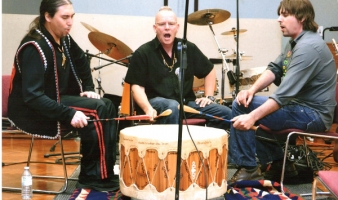An Aboriginal musical group is attempting to bridge the gap between the Church and First Nations peoples in Canada.
Founded by guitarist/vocalist/flautist Jonathan Maracle, born of Mohawk descent, in 1995, Broken Walls also features the talents of Bill Pagaran from Palmer, Alaska on the drums, and Kris DeLorenzi from Thunder Bay, Ontario on bass and backup vocals. The band draws its name from its mission to break down the walls of shame and bitterness that have kept indigenous people groups from embracing the message of the gospel.
Founded by guitarist/vocalist/flautist Jonathan Maracle, born of Mohawk descent, in 1995, Broken Walls also features the talents of Bill Pagaran from Palmer, Alaska on the drums, and Kris DeLorenzi from Thunder Bay, Ontario on bass and backup vocals. The band draws its name from its mission to break down the walls of shame and bitterness that have kept indigenous people groups from embracing the message of the gospel.
"What we're trying to do is have a platform with our music where we can present the love and the free gifts of Jesus without all of the colonial-gospel type of presentation and without the cultural conversion message."
Broken Walls recently returned from the LifeLight festival in Worthing, South Dakota, the largest, free admission Christian music festival in North America. The group is set to release their ninth studio album, The Path, sometime in the new year.
"It ends up being called The Path because it's leading…trying to expose Jesus for who He really is.
"The idea of the whole mission of Broken Walls is to go between the people groups and say 'we need to recognize who Christ really is,'" Maracle says. "Jesus was meant to be a free gift."
Having served as a worship leader for a number of years in a traditional church setting, Maracle felt a calling to reach out to First Nations and Native American groups across the continent, as well as represent those groups as children of God, regardless of their culture or heritage.
Though Maracle reports a generally positive response to what Broken Walls has been doing, it hasn't come without challenges, including hostility from parts of the established Church. Things like the use of traditional First Nations drums have drawn criticism in the past.
"The Church has become almost an industry…I think the focus has been on keeping the machine rolling," he says. "When man's allegiance is superseded by his allegiance to the denomination, that's when we have to start asking ourselves questions."
"Churches for so long looked at our native drums and said 'these drums are not of God,'" he says. For Broken Walls, it's been an uphill battle to convince churches that God's message transcends the way that church has traditionally been done in North America.
"We're not subject to the drum, the drum is subject to us," he says.
Despite the challenges, Maracle maintains that the focus is on the music and outreach of Broken Walls, and their mission to people in North America.
"We've had so many testimonies and so many comments back from people all over the world that are writing and saying 'when your music played, I gave my life the Christ," he says. "When we do our music we try to make each song a genuine message to enlighten, or convict, or do what it needs to do to bring people back to that place of honesty."
Broken Walls recently returned from the LifeLight festival in Worthing, South Dakota, the largest, free admission Christian music festival in North America. The group is set to release their ninth studio album, The Path, sometime in the new year.
"It ends up being called The Path because it's leading…trying to expose Jesus for who He really is.
"The idea of the whole mission of Broken Walls is to go between the people groups and say 'we need to recognize who Christ really is,'" Maracle says. "Jesus was meant to be a free gift."
Having served as a worship leader for a number of years in a traditional church setting, Maracle felt a calling to reach out to First Nations and Native American groups across the continent, as well as represent those groups as children of God, regardless of their culture or heritage.
Though Maracle reports a generally positive response to what Broken Walls has been doing, it hasn't come without challenges, including hostility from parts of the established Church. Things like the use of traditional First Nations drums have drawn criticism in the past.
"The Church has become almost an industry…I think the focus has been on keeping the machine rolling," he says. "When man's allegiance is superseded by his allegiance to the denomination, that's when we have to start asking ourselves questions."
"Churches for so long looked at our native drums and said 'these drums are not of God,'" he says. For Broken Walls, it's been an uphill battle to convince churches that God's message transcends the way that church has traditionally been done in North America.
"We're not subject to the drum, the drum is subject to us," he says.
Despite the challenges, Maracle maintains that the focus is on the music and outreach of Broken Walls, and their mission to people in North America.
"We've had so many testimonies and so many comments back from people all over the world that are writing and saying 'when your music played, I gave my life the Christ," he says. "When we do our music we try to make each song a genuine message to enlighten, or convict, or do what it needs to do to bring people back to that place of honesty."
Would you like to advertise your business or ministry on LHF? Please contact us via e-mail and ask about our advertising options at: [email protected]

